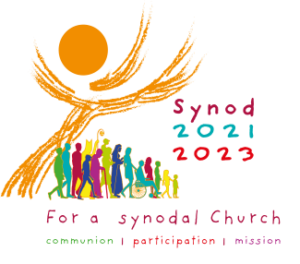A Guide into the Future – The Holy Spirit is With Us
 “It is the decision of the Holy Spirit and of us …” (Acts 15:28)
“It is the decision of the Holy Spirit and of us …” (Acts 15:28)
Members of the early Christian community did not have everything figured out and standardized from the beginning. It’s important for us who look back from two thousand years later to remember this. These were a bunch of fishermen, farmers, tradesmen and women, and even some educated people like Paul. They had a message of amazing good news to share with the world. They had witnessed the life, death, and resurrection of Jesus. They had come to believe in him as their Lord, a title reserved for God. But they were not in agreement on many other things that popped up in the years after the resurrection.
The first reading for the Sixth Sunday of Easter presents an example of one such disagreement that had to be resolved. The reading does not include the entire story of what happened, so here’s a quick summary.
Paul and Barnabas have just completed their first missionary journey in Asia Minor and returned to Antioch in Syria when this reading begins. Their message was mostly rejected by the Jews to whom they first presented it in these lands, but enthusiastically received by many non-Jews. These Gentiles had been welcomed into the Christian community by Paul and Barnabas, who returned to Antioch in Syria with reports of the wonders God was doing among the Gentiles.
Rather than welcome this news wholeheartedly, some members of the community wanted to put extra conditions on admission to membership – first the Gentiles must become Jews in order to be worthy of admission to the new community. Paul and Barnabas rejected this notion and went south to Jerusalem. (The text says they went up to Jerusalem, because that city was located in a mountainous region in the south.)
In Jerusalem, they consulted with the apostles and other elders of the community. The community was not in agreement on the subject. Some argued that only those who were Jewish could be saved, so converts must become Jews and live by Jewish laws. Others argued that becoming Jews was not necessary. Paul and Barnabas described the signs and wonders God had worked through them among the Gentiles. Peter spoke to the community about his experience as the one who baptized the first Gentiles, the family of Cornelius, a Roman centurion in Caesarea. When the Spirit of the Lord came upon Cornelius and his family before they were even baptized, Peter realized baptism could not be denied them based on being Gentiles. He reminded the community of this event and asked why anyone would think other Gentiles should be treated differently.
Finally, after much conversation, debate, and prayer, the community reached an agreement. Gentiles did not need to become Jews in order to be Christians. They needed to “abstain from meat sacrificed to idols, from blood, from meats of strangled animals, and from unlawful marriage.” The community sent two of its members to accompany Paul and Barnabas back to Antioch in Syria with the good news for the new Gentile Christians. (Acts 15:1-2, 22-29)
In this early example, we see the importance of several things in the decision-making of the early Christian community. These include consultation with the leadership, conversation among the members regarding the difference of opinion, reliance on the Holy Spirit to provide insight and guidance in selecting the correct path, and willingness to change accustomed patterns of thinking and acting when situations change and new opportunities open. In presenting their decision, the leaders in Jerusalem made it clear that it was not just their opinion, but that it was the decision of the Holy Spirit that was leading to this major change in an ancient practice.
Jesus, in his final teaching to his apostles the night before he died, made clear that not all would be easy to understand (Jn 14:23-29). He knew that unexpected things would happen in their future. He promised the Father would send the Advocate, the Holy Spirit, to be their guide and remind them of his teachings. They were to follow Jesus’ teaching, his word. In doing this, they would be keeping the word of the Father. Jesus and the Father would come to live within those who keep his word. He promised to give them peace, a deeper peace than any the world can give.
The disciples held on to this promise. Even after Pentecost, as they were fired with faith and courage to go out and share the good news, they counted on the guidance of the Spirit when difficulties arose. During times of persecution and as the years passed and Jesus didn’t return in glory during their lifetimes, this remained a constant.
The reading from the Book of Revelation (21:10-14, 22-23), written long after the events of the other readings, offers a symbolic view of the Church, the new Jerusalem coming down from heaven from God. This city gleams and is radiant with God’s splendor. Its features include twelve gates and twelve foundation stones. The gates, guarded by angels, are named for the twelve tribes of Israel – the chosen people of God who will come from all four directions to this new city. The foundation stones are named after the apostles, upon whose experience and faith the Christian community would stand. But there is no temple building within this new city. The Lord God is the temple himself, lighted by his glory. The Lamb is the lamp through which that light shines.
The presence of God in the Church, the new Jerusalem, the people of God, is the source of all that is to be and the foundation on which the life of the community is built.
We as a Church community have come through a time of great transition in our lifetimes and are seeing new pathways and new understandings of our relationships with each other and with God. It’s been a relatively short time since the Second Vatican Council and the development of the reforms and revised understandings of our relationship with God and the world that it brought. Conflicts among us remain. There is still much to do as we explore the ramifications of the insights of the Council, insights that surprised even those who participated. The Holy Spirit was at work, bringing/calling the Church once again into a newer and deeper presence in our world.
Will we be as brave as those first Christians were in hearing and accepting the guidance of the Spirit? Our world has seen major changes since the early days of the Church and the days of the Council. How have we changed. What have we learned? What areas need our attention and healing now?
We are currently in the process of the first Synod that has ever asked the opinions of lay people about the future of the Church – who we are, what we are called to be, how we are to live in our world. How will we respond as the Spirit speaks through ordinary women and men? Will we trust the Spirit? Are we open to change? Will we follow where the Spirit leads, believing the One who has loved and led us for so long will continue to be there for us too? Will we recognize and accept the peace of the Lord in our lives? The early Church community met, prayed, and discussed changes needed. The Church today continues the same tradition of Synodality. Where will the Spirit next lead us?
“It is the decision of the Holy Spirit and of us …”
Come Holy Spirit!
Read More









